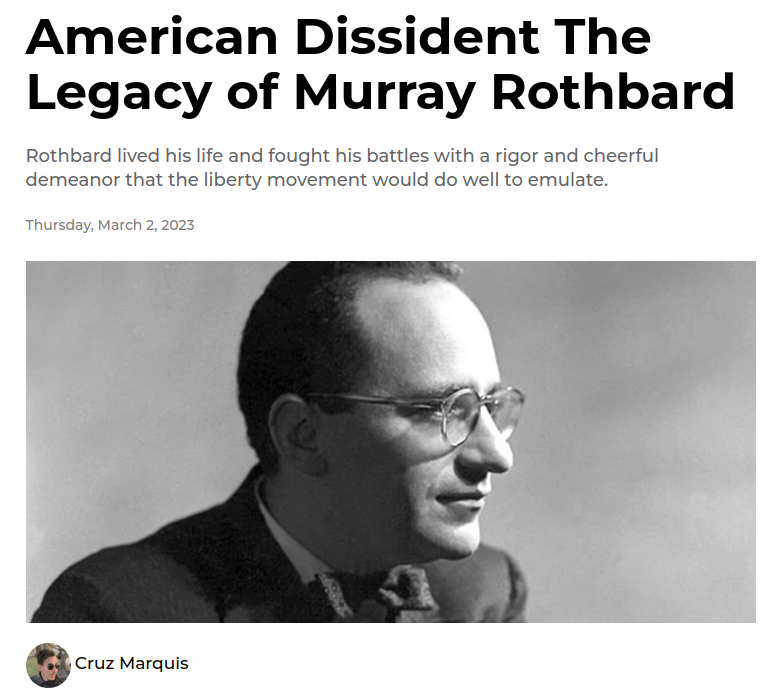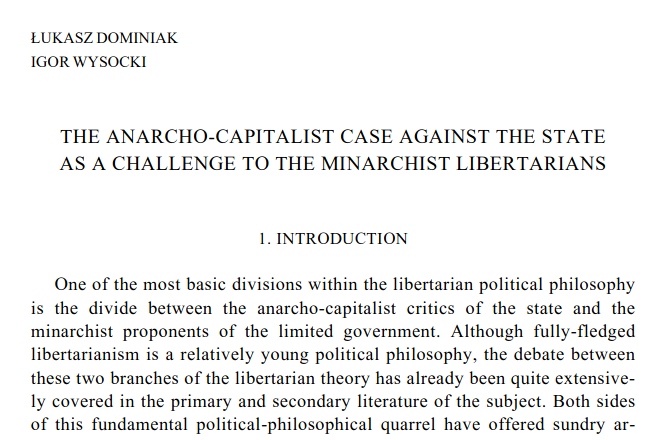Bryan Caplan debates Yaron Brook on anarcho-capitalism. You can safely skip Yaron’s parts, but Bryan’s part are golden.
Murray Rothbard’s 97th birthday
Murray Rothbard continues to be an inspiration, even 28 years after his untimely death. Here are some of the kind words written in honor of his memory.
Curtis Yarvin’s mild critique of libertarianism
Michael Malice invited Dave Smith and Curtis Yarvin onto his show “Your Welcome” to discuss Yarvin’s critique of libertarianism. Yarvin’s arguments aren’t all that novel or interesting, but Malice and Smith keep the show lively by interjecting humor and sensible opinions.
Yarvin thinks libertarianism is unstable, but doesn’t make any arguments as to why. He assumes doomsday scenarios would be triggered by an abrupt move to libertarian principles, e.g. an end to inflation. He thinks libertarianism is not the most effective way to solve problems because it prohibits the use of aggression. And he apparently likes aggression very much, because he argues in favor of inflation, taxes, and wealth redistribution as a practical strategy for improving society. Apparently when he moved away from libertarianism, he moved in the direction of the liberals he so despises.
Dominiak and Wysocki on minarchism
review of the Anarchist Handbook

Michael Malice‘s book The Anarchist Handbook is a collection of essays from anarchists of many varieties, each introduced by the author. Ancaps looking at the rest of the present-day anarchist movement might conclude that there is nothing to learn. However, it is instructive to see how close the idols of other anarchist philosophies came to libertarianism, and how their errors led to things like anarcho-socialism, anarcho-communism, and the like.
Malice, of course, includes some of the best essays in anarchist thought. Featured are Lysander Spooner‘s “No Treason #6“, an excerpt from David Friedman‘s “The Machinery of Freedom“, and the entirety of Murray Rothbard‘s “The Anatomy of the State“.
Continue readingYes, Ancaps Are Anarchists
Springtime of Nations did this fun analysis of the history of anarchism and how ancaps are rightful heirs of the term. The term is traced all the way from Proudhon to Murray Rothbard.
happy birthday Murray Rothbard
Murray Rothbard would have been 95 years old today. Here is a photo of him in 1927 at the tender age of 20 months.
Credits to Jeff Deist of the Mises Institute.
Review of The Micronation Revolution

William Otey’s book The Micronation Revolution is a showcase of government injustices and an exploration of possible solutions. Otey takes a strong minarchist position, advocating the privatization of “most” government functions. Further, he envisions this happening via the spread of small, independent communities, called micronations, that will compete for citizens by moving closer and closer to a classical-liberal utopia.
This free-market approach to developing a better government is reminiscent of Panarchy, Zach Weinersmith’s Polystate, and other competition-in-government approaches. Unfortunately, Otey never considers anarcho-capitalism. His libertarian instincts bring him close at times, but ancaps will be amused at his calls for “near-complete political freedom” and recoil at statements like, “of course some government and some laws are obviously necessary and desirable.”
Continue readingWalter Williams

Walter Williams passed away this morning. He was a well-known professor of economics at George Mason University, having written, lectured, and debated extensively in defense of libertarianism. His contributions to the movement were enormous, and all those who value freedom should be grateful for the ideas he spread and the people he inspired.
If you are not familiar with Williams, please take some time to read his writings and view his media appearances. And if you are familiar, please honor his memory by spreading his wisdom to friends and family.
Anatomy of the State Film
Richard James sends along his new film based on Murray Rothbard’s classic piece Anatomy of the State. In addition to Murray’s excellent prose, it has animations, video clips, and guest appearances by such greats as Walter Williams, Thomas Sowell, and Milton Friedman.




